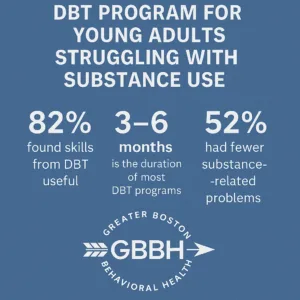When your child is using again, it feels like your heart is living outside your chest—and getting bruised all over again. You’ve done the appointments, the tough love, the waiting up at night. And still, here you are, watching your 20-year-old retreat behind substances they swore they’d walk away from.
If you’re wondering whether anything will work—or if help is still even possible—Dialectical Behavior Therapy (DBT) might offer the kind of structure and support your family needs. At Greater Boston Behavioral Health, our DBT program meets young adults with compassion, not blame—and helps them learn how to navigate life without shutting down or turning to substances to cope.
What Is DBT—and Why Does It Work for Substance Use?
DBT was originally created for people who felt things deeply—sometimes too deeply. The kind of people who lash out, shut down, self-destruct, or numb out in response to emotional pain. If that sounds like your child, it’s not because they’re broken. It’s because they never learned safer ways to survive their pain.
DBT teaches that emotions aren’t the problem—lack of skills is. Through a blend of individual therapy, group skills training, and coaching, DBT helps young adults build real tools for:
- Tolerating distress without numbing out
- Regulating intense emotions without imploding
- Communicating their needs without alienating others
- Being present without judgment
For young adults struggling with substance use, these skills are often the missing piece. It’s not about willpower. It’s about learning how to stay with hard feelings without running from them.
DBT Doesn’t Require Readiness—Just Willingness to Begin
One of the most hopeful aspects of DBT is that it doesn’t expect clients to be “ready” in the traditional sense. Your child doesn’t have to feel 100% committed to change from day one. DBT therapists understand ambivalence. They work with it.
This is critical for young adults who may say they don’t want help—or who’ve been through treatment before and feel like it “didn’t work.” In DBT, motivation is something that can grow. It doesn’t have to show up fully formed.
Inside a DBT Program: What You and Your Child Can Expect
Every DBT program is a little different, but most follow a consistent structure designed to help clients stay supported and accountable. Here’s what typically happens:
Weekly Individual Therapy
A licensed therapist helps your child apply DBT skills to their real-life struggles—substance use, relationship conflict, emotional dysregulation, and more. These sessions are focused and practical, not just open-ended talk therapy.
Group Skills Training
Led by a trained DBT clinician, these sessions teach the four core DBT skill areas:
- Mindfulness – being present in the moment
- Emotion Regulation – managing overwhelming feelings
- Distress Tolerance – surviving crisis without making things worse
- Interpersonal Effectiveness – navigating relationships with clarity and confidence
Between-Session Coaching
Many DBT programs offer coaching access between sessions—short calls or messages that help your child apply skills in the moment. This is where real-time learning happens.
Therapist Consultation Teams
Clinicians in DBT programs don’t work in isolation. They meet regularly to consult with peers, ensuring your child receives the most responsive, ethical, and coordinated care possible.
Relapse Doesn’t End the Road—It’s Part of the Work
Many families fear that relapse means failure. In DBT, relapse is viewed through a different lens. It’s not a moral lapse—it’s a signal that something in your child’s life (or skill set) needs more support.
Instead of starting over from zero, the DBT therapist works with your child to understand what happened, what they were trying to escape or manage, and how to approach it differently next time.
Think of it like teaching someone how to swim: falling under doesn’t mean they’re not learning. It means they need more chances to practice—ideally with someone close by who can guide them back to the surface.
How Families Are Supported in DBT Programs
If you’re reading this as a parent, you’ve likely felt shut out of the process before—either because your child didn’t want you involved, or because the system didn’t make space for you.
Many DBT programs offer:
- Family education groups, where you can learn the same skills your child is learning
- Parent coaching, to help you respond differently when emotions are high
- Optional involvement, allowing you to stay connected without forcing participation
You’re not the problem. You’re part of the environment that can support change—and you deserve care too.
Why Young Adults Respond to DBT Differently
Young adulthood is a confusing, high-pressure time. Expectations are sky-high, and emotional tools are often minimal. That’s a dangerous mix—especially for someone who already feels like they’re “behind” or “too much.”
DBT speaks the language of this generation. It doesn’t shame. It doesn’t demand perfection. It teaches how to notice what you feel, choose how to act, and stay in the moment even when it’s hard.
Many young adults who resisted other forms of therapy find that DBT finally gives them something that clicks.
Why Choose Greater Boston Behavioral Health?
We know that choosing a program is a deeply personal—and often urgent—decision. At Greater Boston Behavioral Health, we’ve designed our DBT program to serve the whole person, not just the symptoms.
Our team is trained in DBT and experienced in working with young adults who feel lost, angry, scared, or checked out. We create a space where hope isn’t forced—but also isn’t forgotten.
To learn more, visit our Dialectical Behavior Therapy program in Boston. And for those in Needham, Newton, or West Roxbury, we have nearby locations to make care accessible.
Frequently Asked Questions (FAQ)
Is DBT only for people with Borderline Personality Disorder?
No. While DBT was originally developed for BPD, it’s now widely used for people struggling with substance use, depression, anxiety, eating disorders, and general emotional dysregulation. It’s especially effective for young adults who feel things intensely.
Can my child do DBT if they’re not sober yet?
Yes, many DBT programs work with clients who are actively using or not yet stable. DBT assumes that change is a process and begins where the person is—not where we wish they were.
How long does a DBT program last?
Most comprehensive DBT programs last 6 to 12 months, depending on the structure and client progress. However, many participants begin seeing meaningful changes in the first 2–3 months.
Will I be involved as a parent?
Yes, if you want to be. Many programs offer optional family support, skills training, or coaching to help parents understand DBT and support their loved one more effectively.
What if my child has tried therapy before and says it didn’t help?
That’s a common experience—and one DBT is built to address. Many clients come to DBT feeling like nothing else worked. DBT focuses on skills and behavior, not just insight, which can feel more practical and empowering for young adults.
Hope Is Still Here. Let’s Talk.
Call (888) 450-3097 or visit Greater Boston Behavioral Health’s DBT program to learn more about how DBT can help your child navigate substance use and emotional struggle—with support, not shame.


